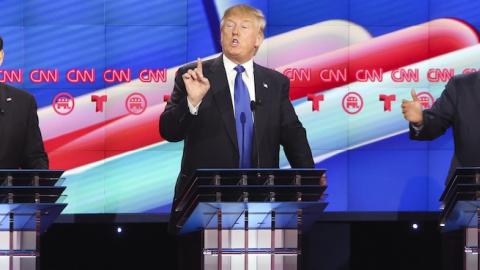With Super Tuesday now behind us, 15 of the 50 states have voted. If this were the Indianapolis 500, only 150 of the 500 laps would now be completed. Donald Trump has won won a plurality of the vote in 10 of the first 15 states—while Ted Cruz has won a plurality in 4 and Marco Rubio in 1—but the Republican frontrunner hasn't won a majority of the vote in any of them. Moreover, on Super Tuesday, Trump's percentage of the vote was more often in the 20s (in three states) than in the 40s (in two). In short, it's time to dig in and fight, not give up and quit.
Still, one must grant this much: Trump will almost surely win the GOP nomination if Cruz (the clear second-place candidate at this point) and Rubio don't start doing a better job of conveying to voters what they're for.
It has become fashionable to say that Trump is winning because he has managed to turn the Republican primaries into a personality contest, rather than a policy contest. In truth, however, Trump isn't just winning on personality grounds; he's also winning on policy grounds. The two most prominent policy positions in the GOP race are both Trump's—being tough on immigration, and being tough with China on trade. These policies may not be particularly well fleshed-out, but they are driving not only Trump's campaign but the whole Republican race.
What, in comparison, are Cruz's two main policies? The first would presumably be his tax plan, but it hasn't achieved as much prominence as either of Trump's two main policy positions. Beyond that, what's next? That Cruz is for a strong air campaign against ISIS? Such a proposal doesn't quite resonate so directly with most voters as Trump's proposals to help the working man. That Cruz would be tough on Iran? He hasn't really made that a centerpiece of his campaign. That Cruz would end President Obama's lawless executive orders on day-one? How about a policy proposal whose execution would extend beyond day-one? That he would pick good Supreme Court justices? That's not a policy.
Cruz has a long history of fighting Obamacare. But what is his policy on Obamacare, other than to repeal it, like every other Republican candidate says he would? How would he bring about repeal? Does he have an alternative in mind that—along with his own strong commitment to the cause—would lead to his being able to sign a nation-defining repeal bill in a way that other candidates' approaches (and their levels of commitment) wouldn't?
Marco Rubio's campaign has probably been even less policy-focused than Cruz's. What are the two main policies that Rubio is espousing? It's very hard to say. His immigration policy usually comes up only when his opponents raise it and attack him on it. The same is generally true of his tax plan. Rubio says he's electable, but that's not a policy—and neither is being pro-Ronald Reagan. To be clear, it's not that Rubio hasn't put forward policies he could talk about; he just hasn't chosen to make them a prominent part of his campaign.
It's no wonder Trump is winning. Not only does he have the two most prominent policy proposals, but those two proposals are all about increasing the economic prosperity of everyday Americans—by leveling what many GOP voters perceive to be an unfair playing field, so that Americans can win on a level playing field. It's a lot clearer to voters how such policies would improve their day-to-day lives than it is for them to see how they'd be better off because Cruz is a conservative purist (a good thing but not self-evidently beneficial in the eyes of most voters, even in a GOP primary) or because Rubio thinks he'd have a good chance of getting elected (if he can win the nomination, after finishing first or second in only three of the eleven Super Tuesday states).
Exit polling in South Carolina found Trump crushing his two main rivals on the questions of who would "best handle the economy" (45 percent for Trump, 18 percent for Cruz, 14 percent for Rubio) and "bring needed change" (45 percent for Trump, 19 percent for Cruz, 16 percent for Rubio).
That trend continued on Super Tuesday. In Arkansas, where Trump nipped Cruz by 2 points and beat Rubio by 8, he beat Cruz by 17 points and Rubio by 24 on the question of who would "best handle the economy" (43 percent for Trump, 26 percent for Cruz, 19 percent for Rubio), and he basically doubled them up on the question of who could "bring change" (47 percent for Trump, 24 percent for Cruz, 21 percent for Rubio). Even in Texas, where Cruz posted an impressive 17-point win and won practically every county, he still lost to Trump by double-digits on the question of who would "best handle the economy"—43 percent for Trump to 32 percent for Cruz (and 13 percent for Rubio)—although Cruz did edge Trump (38 to 34 percent) on the question of who would "bring needed change."
Seeing these results, one would think Cruz and Rubio would eagerly be telling voters what policies they would implement to bring about needed change and improve voters' economic prospects. After all, it shouldn't be that hard to beat Donald Trump on policy grounds. His tax plan alone would add more debt ($10 trillion) than seven years of Obama. He knows nothing about Obamacare or what to replace it with. He appears to oppose the crucial Paul Ryan-style Medicare reforms that are at the heart of GOP efforts to rein in long-term federal spending. He is vulnerable to attacks on all of these fronts and many others, and those attacks should be made.
But at some point, Trump's opponents will have to provide policy-based reasons to vote for them and not simply against him. The Federalists beat the Anti-Federalists, and Trump will likely beat the anti-Trumps—so long as they are letting themselves be defined in that way. To become the nominee, Cruz or Rubio will have to show why a wide cross-section of Republican voters should care about putting one of them in the White House, not just preventing Trump from taking up residence there.















